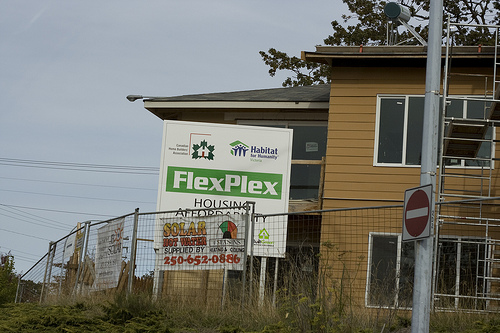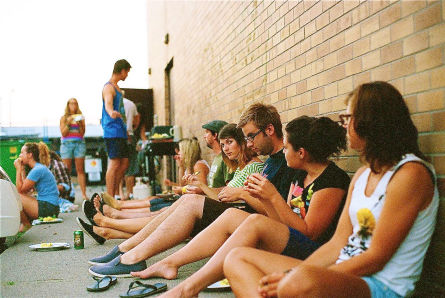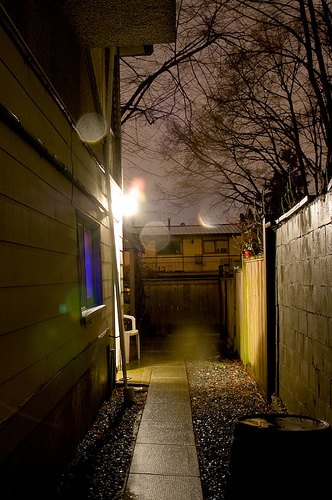By Nick Ubels (The Cascade) – Email
Date Posted: October 20, 2011
Print Edition: October 19, 2011
“One place we looked at had a laundry, but it was in this creepy shed out back.”
“Yeah, I would guess that most suites aren’t 100 per cent legal.”
I listen to this exchange while seated on a navy blue couch in a modest half-basement suite in East Surrey. Stacks of empty Cuisinart and KitchenAid boxes are piled high in front of a door to a shared laundry. Three different tenants rent portions of this house. Newlyweds Matt and Katie Tressel have invited me in to talk about their experience trying to find a place to live. After a long, frustrating search for a decent and affordable space, the couple seems relieved to have found anything liveable that also fits their budget.
“I feel like we were restricted by our price range because we really didn’t look at what’s available at the higher levels,” Katie explains. A young family with one child and another on the way rents the remaining half of the basement level. “This is okay for us, but having this closeness to our neighbours is kind of weird.”
Katie tells me that their four-month search was full of “dead ends and lost trails.” There are few resources available to help the ever-growing number of renters find suitable accommodation. Major print publications like The Vancouver Sun who run a Homes section virtually ignore rental options in their coverage. During the couple’s search, Matt was required to check Craigslist two or three times each day because the best listings would be closed within hours.
“The ones that have a good suite are gone like that,” Matt says, snapping his fingers for emphasis.
Both Katie and Matt are college students working upwards of 20 hours per week trying to make ends meet. Katie has her sights on becoming a French immersion teacher and Matt, a musician. Despite their promising careers, they remain unsure when or if they will ever be able to move out of the renter’s market. And they’re not alone.
Home ownership was once a viable option for B.C.’s working families. But over the past decade, skyrocketing property values have shut out a new generation of potential home owners. According to an August report by the RBC, the greater Vancouver area’s affordability has deteriorated significantly in recent years. The report determines affordability by calculating ownership costs as a percentage of household income. In British Columbia, the affordability index rating for a two-story home is inching closer to an all-time high of 80 per cent. The national average is only 49 per cent. Bear in mind that after a hefty 20 per cent down payment, banks will only grant a mortgage when the monthly payments do not exceed 40 per cent of a family’s household income. For most people in B.C., their income would not even support the mortgage on a condominium.
Living in an apartment or basement suite brings its own set of challenges. With neighbours so close, privacy is often compromised. As a working musician, Matt is unable to fit in much-needed practice time at home. Instead, he has to seek out empty rehearsal spaces at school. This makes it much more difficult to harness creative inspiration when it strikes.
“I think that the increasing rental population will completely change the culture of this area,” he says. “It’s going to have a big impact on community as well because I don’t think you’ll get to know your neighbours the same way because they might move more frequently.”
Katie is worried that this shift from ownership to renting will put their lives on hold indefinitely. “I don’t want to have a family while we’re renting a basement suite, but how do you afford to buy a house when you have a family?” she says. “I read an article about how women in BC are having kids super, super late and it makes sense now. It has a big effect on how our society is shaped.”
Two days later, I call Habitat for Humanity Vancouver CEO Tim Wake to ask him how he would describe the need for more affordable housing in B.C. He answers me in one word: “acute.”

Tim Wake is a former real estate developer who has spent the better part of his career advising municipalities on how to keep their housing costs low. He tells me the root of the problem is a very successful real estate market. His solution? Greater collaboration between local government, the private sector and non-profits.
Mr. Wake focuses on what he calls, “middle sector housing”: low-cost, shared equity housing projects for the middle income sector. The resale value of these houses would be capped below market prices at a steady incline. A small number of co-operative housing projects along this model are just starting to crop up, such as Abbotsford’s Harmony project, or Yarrow’s EcoVillage. In the meantime, Wake recommends that young people continue to rent and save money for a down payment until the housing market stabilizes.
In Abbotsford, an inspired group of young people are banding together to make the most of the housing crisis.

At 10:08 on a brisk, autumn morning, I ring the buzzer at the street-level entrance to the Fraser Valley Inn. The aged redbrick building sits on the main drag of old downtown Abbotsford, a remnant of a bygone era, seemingly immune to the rigors of gentrification. On its north face, the gaudy red and white marquee of the Air Fare Lounge towers over the corner of Essendene and West Railway, while on the east side, there is an ancient and crowded liquor store. Among the building’s other lease-holders are New Passage to India – a cozy little restaurant specializing in traditional Indian cuisine – and upstairs: the Atangard Community Project.
A few moments later, I am ushered inside by one of the project’s directors, Sophie Suderman, who leads me past a rickety stand-up piano and up the stairs. The 18-room single and double occupancy housing project takes up much of the Fraser Valley Inn’s second floor. Each apartment in the Atangard is between 150 and 300 square feet, not including individual bathrooms, one of the conveniences of renovating an old hotel. Indie rock and the dizzying pitch of at least five voices laughing and talking excitedly over each other issues from the kitchen. Sophie takes me on a tour through the two guest rooms, four common rooms, and a bike storage locker that is so full it overflows into the laundry room. A fresh coat of paint covers the uneven surface of the walls and a mishmash of art and photography lines the halls. In another life, the Fraser Valley Inn was a run-down one-star SRO until it was shut down by the city in 2005 because of the social problems it created. The Atangard group has since renovated, pulling up the old carpet to reveal a beautifully-aged plywood floor and stocking the common rooms with thrift store furniture, old pub chairs, bright paint and new kitchen appliances. It still feels a bit musty, but clean and lived-in. “It’s really what you make of it,” Sophie tells me. For the 25 young people who live there, it’s a home.
Since 2009, the Atangard has provided affordable housing in a community setting for students and working people between the ages of 19 and 35. Sophie tells me that she first started working on the project over four years ago in response to what she saw as a great need for reasonably priced, community-based living for this neglected demographic.
“Our society is so driven to achieve and relationships fall to the side,” she says. “A situation like this meets both the relational needs as well as the need for affordability.”
She explains that it can be difficult for young people to split the rent in other community living arrangements because of the instability of this age group. If one roommate decides to move out, everyone else is caught in the lurch. The Atangard Community Project Society manages tenant-lease agreements and could absorb the cost of an empty room for a month if need be. So far, this has not been a problem thanks to a steady waitlist of interested tenants. Sophie told me that this demand has prompted discussions about how to create a similar arrangement elsewhere.
Passing by the communal dining area, I am invited by a few tenants to join them for pancakes and coffee. Everyone is in good spirits, decked out in sweatpants and t-shirts. A few laptops are open and everyone seems to linger around the table long after they finish their breakfast. Mark, who is sitting across from me, is tending to a Shirley Temple that he drinks out of a jam jar. “Every time I see him, he has one,” Emily tells me. The scene speaks volumes about the character of this community. It’s like a patchwork quilt: warm, tightly stitched together and possessed of a certain ramshackle charm. I ask my tablemates what it’s like to live at Atangard.
“Practically speaking, it’s very easy to live cheaply, simply here in this space because we have a lot of other things that are not included in a normal person’s rent,” Chad says. For instance, each tenant is expected to cook dinner once or twice a month for the entire group. That way, they can save money by buying ingredients in larger quantities and spend less time worrying about making a healthy meal. Some of Atangard’s other projects include an auto pool and a community garden.

Although there are many benefits provided by community living, things are far from perfect.
“It’s important to realize it’s not a utopia,” Chad says. “We’re talking in very idealist ways, when in reality this is something we’re striving to achieve.”
Yet Atangard does help fill a significant gap in today’s housing market. It acts as a reprieve for young people struggling to find a decent place to hang their hat. And when I ask Adam where he would be if not Atangard, he tells me bluntly: “probably a shitty basement suite for a couple hundred dollars more.”


